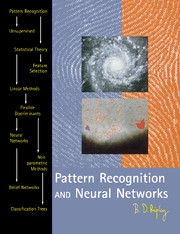Book contents
- Frontmatter
- Contents
- Preface
- Notation
- 1 Introduction and Examples
- 2 Statistical Decision Theory
- 3 Linear Discriminant Analysis
- 4 Flexible Discriminants
- 5 Feed-forward Neural Networks
- 6 Non-parametric Methods
- 7 Tree-structured Classifiers
- 8 Belief Networks
- 9 Unsupervised Methods
- 10 Finding Good Pattern Features
- A Statistical Sidelines
- Glossary
- References
- Author Index
- Subject Index
Preface
Published online by Cambridge University Press: 05 August 2014
- Frontmatter
- Contents
- Preface
- Notation
- 1 Introduction and Examples
- 2 Statistical Decision Theory
- 3 Linear Discriminant Analysis
- 4 Flexible Discriminants
- 5 Feed-forward Neural Networks
- 6 Non-parametric Methods
- 7 Tree-structured Classifiers
- 8 Belief Networks
- 9 Unsupervised Methods
- 10 Finding Good Pattern Features
- A Statistical Sidelines
- Glossary
- References
- Author Index
- Subject Index
Summary
Pattern recognition has a long and respectable history within engineering, especially for military applications, but the cost of the hardware both to acquire the data (signals and images) and to compute the answers made it for many years a rather specialist subject. Hardware advances have made the concerns of pattern recognition of much wider applicability. In essence it covers the following problem:
‘Given some examples of complex signals and the correct decisions for them, make decisions automatically for a stream of future examples.’
There are many examples from everyday life:
Name the species of a flowering plant.
Grade bacon rashers from a visual image.
Classify an X-ray image of a tumour as cancerous or benign.
Decide to buy or sell a stock option.
Give or refuse credit to a shopper.
Many of these are currently performed by human experts, but it is increasingly becoming feasible to design automated systems to replace the expert and either perform better (as in credit scoring) or ‘clone’ the expert (as in aids to medical diagnosis).
Neural networks have arisen from analogies with models of the way that humans might approach pattern recognition tasks, although they have developed a long way from the biological roots. Great claims have been made for these procedures, and although few of these claims have withstood careful scrutiny, neural network methods have had great impact on pattern recognition practice.
Information
- Type
- Chapter
- Information
- Pattern Recognition and Neural Networks , pp. ix - xiPublisher: Cambridge University PressPrint publication year: 1996
